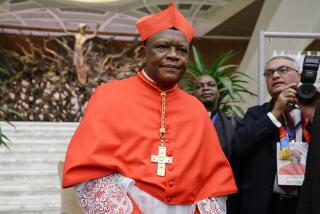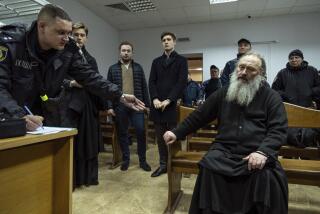Orthodox Patriarchs Decry Vatican ‘Proselytism’ : Eastern Europe: Roman Catholic missionary work escalates the churches’ conflict.
- Share via
ISTANBUL, Turkey — The patriarchs of the world’s 150 million Orthodox Christians condemned the Vatican of Pope John Paul II on Sunday in an escalating conflict over the religious future of the newly independent lands of Eastern Europe.
“Certain circles inside the Roman Catholic Church proceed to activities absolutely contrary to the spirit of dialogue,” the Orthodox patriarchs declared at the end of a three-day meeting unprecedented in the history of their ancient church.
The core of the dispute is missionary work by Catholic and other non-Orthodox churches in the traditional Slavic homelands of Orthodoxy, only recently freed from the yoke of Communist restrictions.
“Proselytism . . . is absolutely condemned by the Orthodox,” said the statement, read out by a black-robed metropolitan from a high pulpit as the patriarchs celebrated a special Mass behind a screen of age-darkened icons.
“Proselytism, sometimes through material enticement and sometimes through various forms of violence (in the occupation of churches), poisons the relations among Christians and destroys the road toward their unity.”
Schismatics and Protestant fundamentalists--many from American evangelical sects--were also condemned for missionary activity. But the patriarchs and archbishops of the 13 autonomous national Orthodox churches present this weekend reserved their special anger for Rome.
“The Orthodox are not against Catholicism,” said Metropolitan Cyril of Smolensk, speaking for Patriarch Alexi II of Russia. “But we are categorically against the main trend to hit the Orthodox church, to destroy the Orthodox presence. We cannot accept these barbarous methods.”
Metropolitan Cyril met for talks with the Vatican in Geneva in early March but said it remains to be seen whether the Roman Catholics would stick to a promise to coordinate the establishment of any new structures in Russia.
The burning issue of Uniatism remains--a centuries-old problem of local churches that keep much of the old Orthodox liturgy and vestments but have switched their allegiance to Rome.
“They (the Vatican) say Uniatism is not the route to (Christian) unity. Then they say this is not stated in official Catholic documents. They give the impression of a double attitude,” said Metropolitan Daniel of Moldova.
The Orthodox said that the statement is not an ultimatum, but the patriarchs’ statement declared that “dialogue (with the Catholics) has already been restricted to the discussion of the problem of Uniatism until agreement is reached on this matter.”
The next Catholic-Orthodox meeting is scheduled to be held in Lebanon this summer, and the Orthodox said that the meeting could go ahead if the agenda is restricted to the Uniate issue.
For the past decade, theological dialogue had aimed to heal a 900-year-old split between the great Eastern Orthodox and Western Catholic branches of Christianity.
The Orthodox emphasize ritual, monasticism and mysticism, and the main doctrinal differences with the more social-minded Catholics are a denial of both Purgatory and the immaculate conception.
While Catholic-Orthodox relations took a turn for the worse at the meeting in Istanbul--which has been the center of the Orthodox faith since the days it was Constantinople--it marked a high point of unity for the Orthodox themselves.
Never before have all the patriarchs of the autonomous national churches been gathered together, bishops said.
Bearing icon paintings of Jesus, Mary and the apostles in honor of Sunday’s anniversary of the great reunion of the Orthodox church at the end of the iconoclast period in AD 843, the patriarchs greeted a crowd of local Greeks in their splendid silk and velvet vestments, topped by rounded crowns of gold encrusted with pearls and precious jewels.
The meeting was held at the Phanar patriarchate beside Istanbul’s historic Golden Horn sea inlet and was a personal initiative and triumph for the relatively youthful ecumenical patriarch, Bartholomew I, 51, who was enthroned only five months ago.
More to Read
Sign up for Essential California
The most important California stories and recommendations in your inbox every morning.
You may occasionally receive promotional content from the Los Angeles Times.













